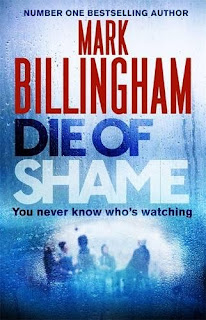Die of Shame - Mark Billingham
It's a pity then that Billingham's signature DI Tom Thorne novels have been so inconsistent of late. Perhaps it's over-familiarity with characters that have overstayed their welcome, but the usually reliable characterisation seems to be increasingly let down by some improbable plotting and inconsistent behaviour, not least of which is the almost incredible incompetence demonstrated by the books' lead character. Billingham's standalone crime fiction outside of the main Thorne novels has however often been a more interesting ground for diversification and ways of exploring other aspects of murder and its relationship with the English psyche.
In his latest standalone Die of Shame, Billingham finds another interesting aspect of the English psychological make-up to explore and a good way to push that sentiment towards murder. He also finds an interesting way to gather together a group of diverse characters for a traditional whodunit in the process by having them all form part of a group therapy session for recovering addicts. One of the regular Monday group session has been murdered, and the police have reason to believe that the murderer was someone known by the victim. Since addicts tend to have few friends or acquaintances, it would seem to point to one of the other members of the self-help group being the murderer.
It seems a little convenient to have both the victim and the murderer as part of a group dedicated to self-analysis, Billingham thereby having an easy way of delving into the troubled backgrounds of his characters ("tell me about your childhood..."). It's all about how you play the game however and with Billingham's accuracy of character detail and sense of humour, he plays it very well indeed. Reflecting the fact that addiction comes in many forms - drugs, alcohol, sex, shopping, gambling - the characters in Die of Shame are a diverse bunch from all walks of life and Billingham doesn't feel the need to show any of them in any kind of a sympathetic light.
What their therapist Tony da Silva (himself a former addict) believes that they have in common, is that there is a significant event in their past that is the core that feeds their addiction. Shame most likely lies at the root of their problem, and their addiction is a way of blocking it out. As he gets each member of the group to talk about a shameful act in their past, Tony hopes that the openness will be good not only for the person making the confession, but that it will help the other members of the group see their own problem in a different context. The dynamic in the group however, always fluctuating and changeable according to individual circumstances, seem to become even more fractious and results in one person's death.
If you've read Billingham's brilliant Rush of Blood - where the group were inventively a bunch of aspirational middle-class dinner-party goers who met on an ill-fated foreign holiday - or if you've read any whodunit really, you'll be familiar with the method employed here. Basically, as different aspects of the suspects are revealed, it could turn out to be any one of them who is the killer. Every one of them has a particular flaw or a motive or the potential to kill. Billingham's area of expertise however is very much in how he ties it to English social classes, attitudes and behaviours. The little pop references he crams in are not just for nostalgia or humour, but they reveal little details about memory, about families and growing up. They are things that define and reveal character; the things that can lead one to go off the rails.
And when you've got a group of addicts, not only is there likely to be a few skeletons of shame to uncover, but there is also one other characteristic that is going to make a whodunit that little bit more interesting. Addicts are prone to lying. Rather than rely on some convoluted structure or plot twist (which Billingham has been known to employ in the past, sometimes spectacularly, sometimes less convincingly), Die of Shame then relies on more conventional means, dividing the novel into the therapeutic language of the Then and the Now, between the sessions leading up to the murder and the investigation being carried out afterwards. The revelations at the end of Die of Shame consequently doesn't have the full impact you might like, but Billingham's handling of both the investigation and characterisation throughout is terrific and the novel is every bit as 'addictive' a page-turner as it should be.
Die of Shame by Mark Billingham is published by Sphere on 5th May 2016




Comments
Post a Comment